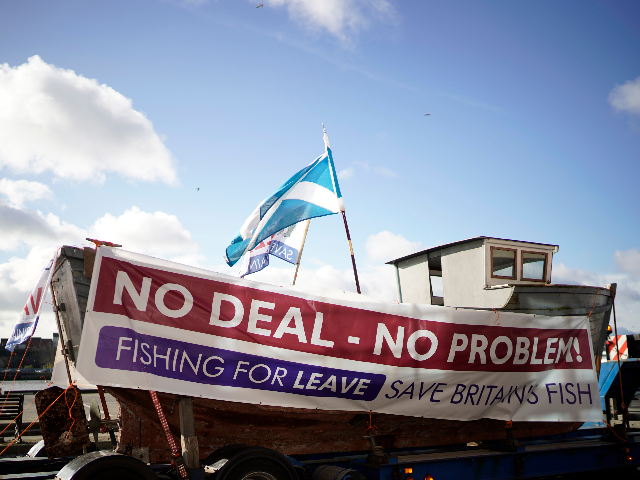

Barrie Deas, chief executive of the National Federation of Fishermen’s Organisations (NFFO), says Boris Johnson’s Brexit deal is “a defeat”, with the Tory accused of having “bottled it” on fishing and “sacrificed” the country’s long-suffering fishermen.
“When push came to shove, despite the legal, moral and political strength of our case, fishing was sacrificed,” Deas lamented in a St Stephen’s Day interview reacting to news that Johnson’s deal included a further five-and-a-half year “transition” for EU trawlers — on top of the almost four years they have already had since the 2016 vote to leave the EU — to plunder British fisheries, with promises of full sovereignty after this period looking increasingly shaky.
“[T]he EU made the whole trade deal contingent on a UK surrender on fisheries,” the fishing industry leader continued.
“In the end-game, the Prime Minister made the call and caved in on fish, despite the rhetoric and assurances that he would not do what Ted Heath did in 1973,” he added.
Edward ‘Ted’ Heath was the controversial Tory prime minister who took Britain into the European Economic Community (EEC), as the EU then was, without a referendum.
Brussels had changed its rules to designate fisheries as a so-called “common resource” until its management right before the British joined, bringing the richest fisheries in Western Europe with them, in a move which would prove devastating for the country’s fishermen as the bloc shared out the lion’s share of stocks to foreign fleets.
Heath had known the Common Fisheries Policy (CFP) would deliver a hammer blow to the British fishing industry but pressed on anyway, with official notes released decades later revealing officials had decided fishermen were “expendable”.
THREAD ON FISHING: I’ve spent hours poring over the #BrexitDeal
* There are 87 species of fish subject to shared EU/UK quotas* In 2020, across them all, UK gets average 33.6% of quotas
* In 2026, it “rises” to 35.92%
>> So the UK gets just 2.32% more fish after Brexit << pic.twitter.com/HmTs7Neafz
— Martin Daubney (@MartinDaubney) December 27, 2020
Claims by the Prime Minister and his team that 25 per cent of the fish the EU currently takes from British waters — far less than British negotiators had been asked for, and a far cry from the full control over national fisheries enjoyed by countries such as Iceland and Norway — will be returned, little by little, over the course of the transition are also being questioned by groups such as Fishing for Leave and former Brexit Party politicians including Martin Daubney, who are struggling to find how even this modest figure has been arrived at based on their own readings of the published figures.
“The deal means we’re still tied to the apron strings of the EU, we’re not an independent coastal state,” agreed Jim Portus, chief executive of the South West Fish Producers Organisation.
“I’m at the end of my working life but [Boris Johnson] made promises directly to fishermen and I am very disappointed for them. We should be rebuilding our fleet, encouraging our youngsters. We should be planning for a resurgence instead of being sold down the river again,” he said.
“Really annoyingly embodied in the deal is a reference to penalties and compensation which must be paid to foreign fishermen if we decide to deny them access to our 12-mile limit in five years’ time. It is disgraceful that he [Johnson] has allowed himself to be dictated to by Brussels,” he added.
Portus’s remarks on “penalties and compensation” touches on a growing concern among Brexiteers attempting to pore over the extremely lengthy deal agreement, clinched on Christmas Eve and not immediately released for scrutiny, leaving very little time to find any serious issues before the end of the year.
Brexiteers supportive of Johnson fondly imagine that the fisheries “transition” is just one more bitter pill that must be swallowed ahead of full sovereignty, with the much-diminished British fishing fleet rebuilt in the meantime — but some are arguing it is not at all clear that this is what will happen, despite Johnson’s assurances, pointing to language in the deal which suggests similar arrangements are to be carried forward once the five-and-a-half years are up.
It is also unclear if the deal allows for any rectification of rules which allow foreign trawlers which operate out of foreign ports from simply flagging as British in order to erode what little quota is left to Britain — a tactic the British were prevented from banning in the 1980s when judges rules that doing so would violate European law.
‘@john_lichfield is spot on. Have also been analysing this. There is no “transition” to unfettered control in 5 years’ time. If we seek to alter fishing quotas then we will face tariffs and worse.
Fishing was sacrificed in 1973. This deal does not return our waters. https://t.co/FplKamCXWc
— Ben Habib (@benhabib6) December 27, 2020
It is not immediately clear what the Prime Minister has received from the EU in return for having “sacrificed” fishing, either.
The 40+ billion euro “divorce” settlement the EU demanded is still to be paid in full, Northern Ireland will be subject to EU rules and regulations enforced by EU personnel deployed to the British province, including a partial economic border with Great Britain, and competition and tendering rules which have seen public contracts even for Britain’s post-Brexit blue passports awarded to foreign firms will essentially remain in place, for example.
It is true that the Prime Minister has secured free trade in goods, but this massively benefits the EU, which sells far more to the United Kingdom vice versa.
Trade in services, where the advantage belonged to Britain, was not covered by the deal in the same way.
JPMorgan on the Brexit deal: pic.twitter.com/V3itxeqnVJ
— Guy Faulconbridge (@GuyReuters) December 24, 2020
 RSS Feed
RSS Feed















 December 28th, 2020
December 28th, 2020  Awake Goy
Awake Goy  Posted in
Posted in  Tags:
Tags: 













